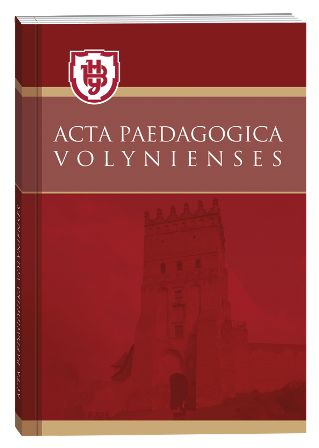MODIFICATION OF THE PROGRAM «FOLK CREATIVITY» AS A SATISFIATION OF THE EDUCATIONAL NEEDS OF STUDENTS WITH INTELLECTUAL DISABILITIES
DOI:
https://doi.org/10.32782/apv/2023.1.17Keywords:
students with intellectual disabilities, socialization, afterschool education, folk crafts, folk creativityAbstract
The article presents the modified program «Folk creativity» from the decorative and utilitarian profile of the artistic and aesthetic direction of afterschool education at the primary and basic levels. The purpose of the article is to reveal the content of the «Folk creativity» program, built taking into account modality-specific patterns of development and socialization of schoolchildren with intellectual disabilities. The purpose of the educational program «Folk Creativity» is to promote the development and socialization of schoolchildren with intellectual disabilities by engaging them in folk crafts and forming educational-cognitive, life-practical, civic and social, subject (technological) competencies. The program contains the simplest information for practicing Ukrainian folk arts and crafts, which do not require complex equipment, educate independence, form goal setting and develop aesthetic taste. The program of the initial level of education is designed for four years, the program of the main level – for six. The content of the program involves deepening the subject (technological) competence that children acquire in the lessons of manual labor and labor training in the institution of general secondary education. The main sections of the entry-level program are work with plastic materials (salt dough); paper and cardboard; natural materials; pysankarstvo The basic level program consists of the following sections: work with plastic materials; care for indoor plants; basics of forestry; work with textile materials; vine weaving; bead work; Ukrainian folk embroidery; penmanship; pottery It is emphasized that the involvement of children in handicrafts has a distinct corrective, vocational orientation and socialization orientation. The program is built according to the linear-concentric principle, using a tabular method. The content of the educational material by years of study is given, the educational achievements of the students of the circle are characterized, and the direction of corrective and developmental work when mastering each program section. This program has been approved, the results of the implementation of the modified program testify to its effectiveness.
References
Гаяш О.В. Сутність процесів адаптації та модифікації для ефективності навчання учнів з особливими освітніми потребами. Інновації партнерської взаємодії освіти, економіки та соціального захисту в умовах інклюзії та прагматичної реабілітації соціуму : матер. V міжнар. наук.-практ. конф., м. Кам’янець-Подільський, 27–28 травня 2021 р. Кам’янець-Подільський, 2021. С. 172–174.
Коваленко В. Є. Особливості діяльнісно-поведінкового компонента соціалізованості молодших школярів з інтелектуальними порушеннями. Особлива дитина: навчання і виховання. 2022. № 1(105). С. 30–42.
Коваленко В. Є. Результати впровадження структурно-функціональної моделі соціалізації та розвитку школярів з інтелектуальними порушеннями у творчих об’єднаннях позашкільної освіти. Науковий часопис. 2022. Випуск 43. Корекційна педагогіка. С. 16–26.
Навчальні програми з позашкільної освіти. Художньо-естетичний напрям : вип. 2 / за заг. ред. Г. А. Шкури, Т. В. Биковського. Київ : УДЦПО, 2016. 267 с.
Програми з корекційно-розвиткової роботи для дітей з порушеннями інтелектуального розвитку : веб-сайт МОН України. URL: https://1bestlinks.net/kNVsb (дата звернення: 04.03.2023).6. Синьов В. М. Психолого-педагогічні проблеми дефектології та пенітенціарії. Київ : «МП Леся», 2010. 779 с.
Христук О. Л. Психологія девіантної поведінки. Львів : ДУВС, 2014. 192 с.
Kovalenko V., Syniov V., Peretiaha L., Halii A. The current state of involvement of children with special educational needs in out-of-school education in Ukraine. Amazonia Investiga. 2021. 10(42). P. 31–42.
Kovalenko V., Bystrova Yu., Kazachiner O. Social and pedagogical support of children with disabilities in conditions of general secondary educational establishments. Journal for Educators, Teachers and Trainers. 2022. Vol. 12(3). P. 101–114.
Kovalenko V., Bystrova Yu., Sinopalnikova N. Features of understanding and emotional attitude toward the moral and social norms of pupils with intellectual disabilities. Laplage em Revista (International). 2021. Vol. 7. P. 575–588.







